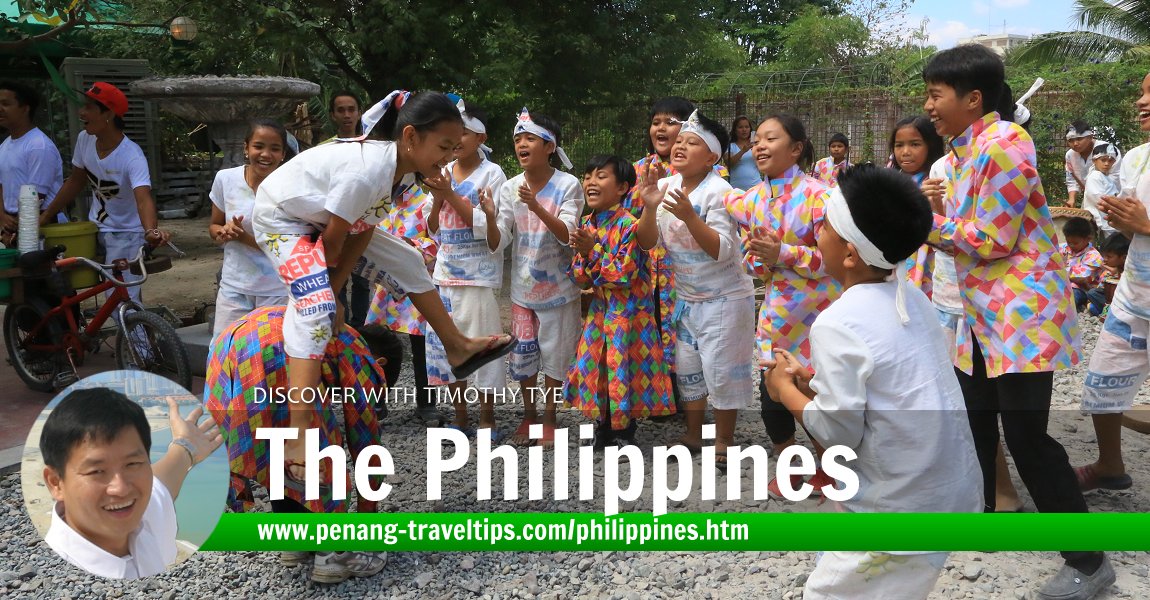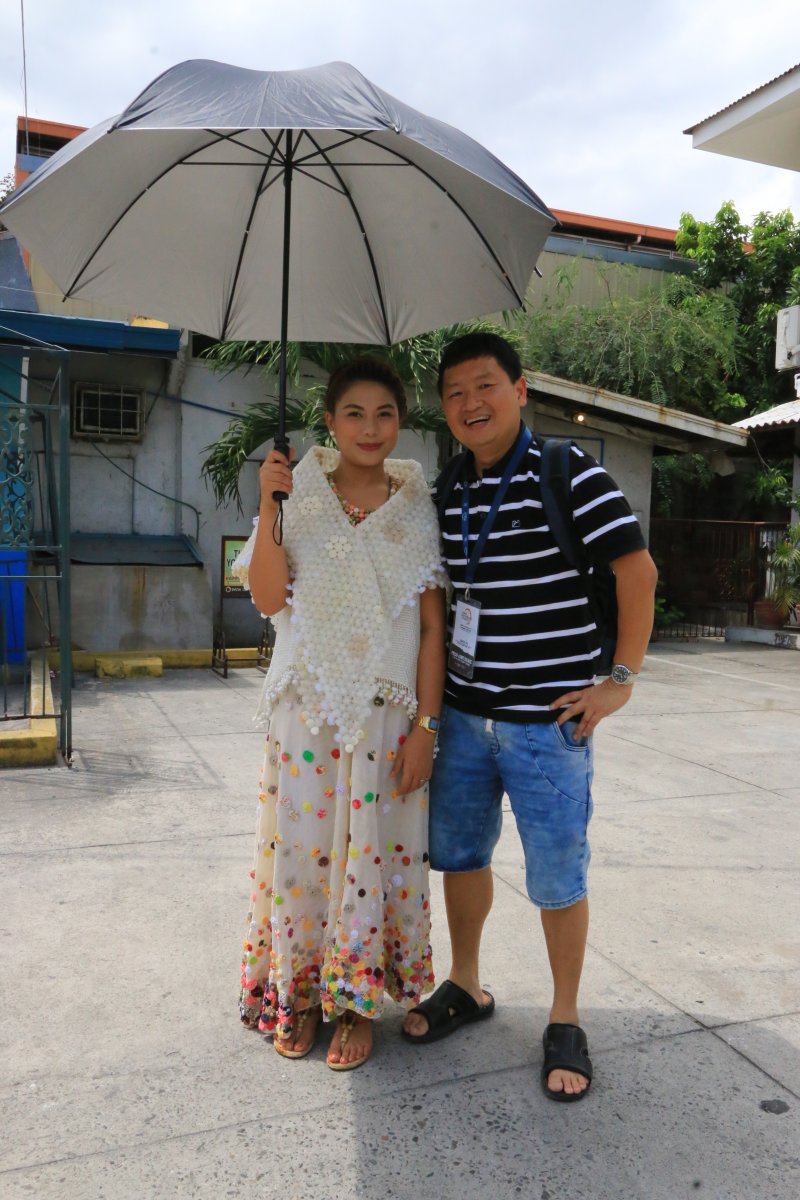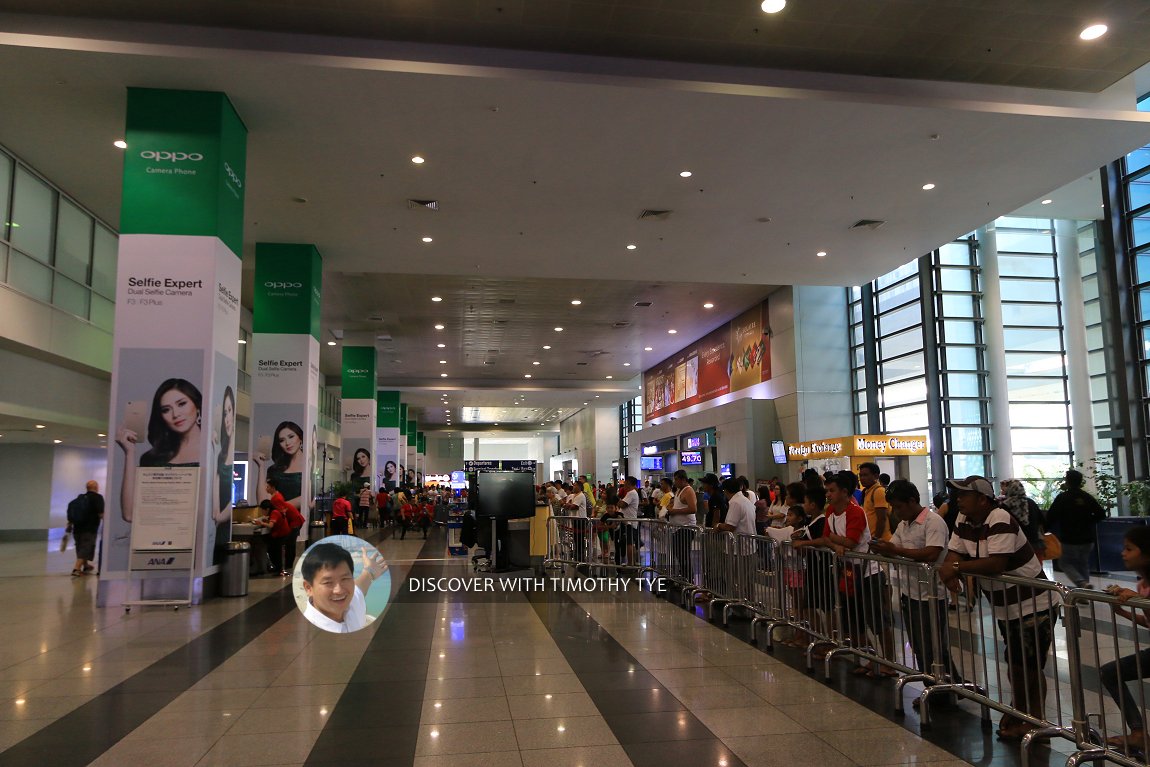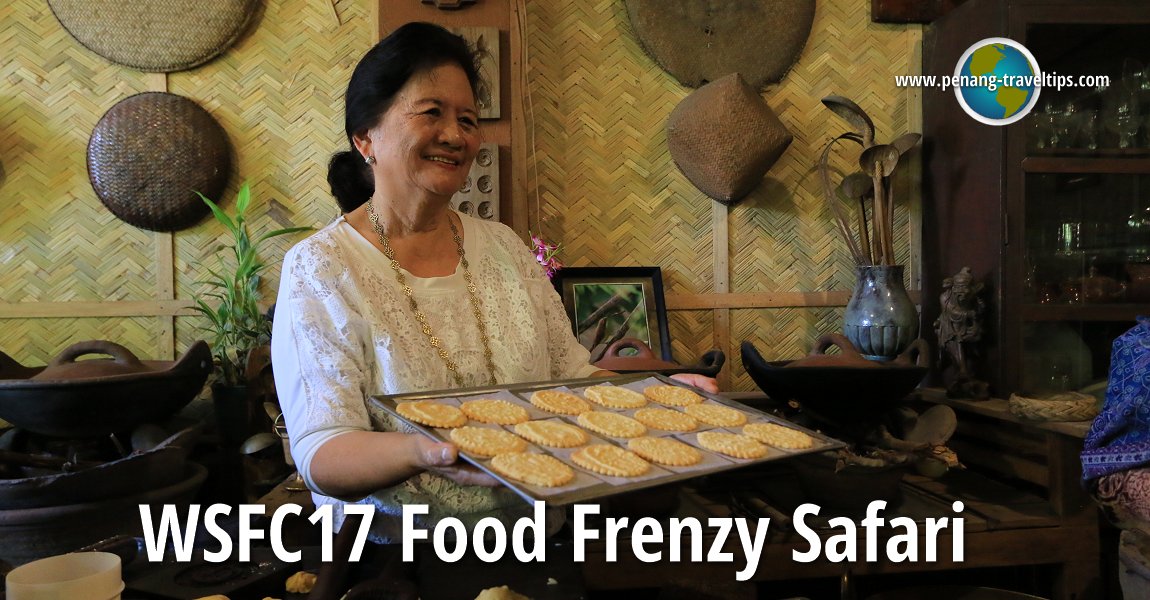 Philippines (4 April, 2017)
Philippines (4 April, 2017)
Versi B. Melayu
Philippines provides you information to plan and enjoy your visit to the Philippines, an archipelago nation in Southeast Asia. The Philippines covers 299,764 sq km (115,831 sq mi) and comprises 7107 islands on the western Pacific Ocean. With about 92 million inhabitants (2011 estimate), the Philippines is the world's 12th most populous country. Its capital is Manila while its most populous city is Quezon City. Both Manila, Quezon City and over a dozen other Filipino cities are part of a metropolis known as Metro Manila.
Being an island nation, the Philippines is a country surrounded by bodies of water. Its immediate neighbours include Taiwan, across the Luzon Strait in the north, Malaysia, across the Sulu Sea to the southwest, and Indonesia, across the Celebes Sea to the south. The South China Sea separates the Philippines from Vietnam. To the east of the country is the Philippines Sea, which is contiguous with the Pacific Ocean.
What to eat in the Philippines
- Bulalo at Bulaluhan sa España in Manila, Philippines was recommended by Timothy Tye on 28 August, 2019
WSFC17 Food Frenzy Safari
A prelude to World Street Food Congress 2017 is the Food Frenzy Safari, a 15-hour food journey on 4 April 2017, which took members of the international media through Metro Manila and Pampanga Province, to get to know traditional Filipino cuisine.Details
Main Cities of the Philippines
- Manila (1,661,000)
- Quezon City (2,700,000)
- Antipolo City (634,000)
- Caloocan City (1,379,000)
- Cebu City (799,000)
- Davao City (1,363,000)
- Pasig City (617,000)
- Taguig City (613,000)
- Valenzuela City (569,000)
- Zamboanga City (774,000)
Places of Interest in the Philippines
Ten Biggest Islands of the Philippines
 With a Filipina girl in Angeles (13 May, 2019)
With a Filipina girl in Angeles (13 May, 2019)
The Philippines was a former colony of Spain, and the United States. It is one of two only predominant Roman Catholic countries in Asia, the other being East Timor. In addition to the Roman Catholics, there are also a number of minority religious groups, including various Christian denominations, Islam, Buddhism, Hinduism, and other beliefs. Multiple ethnicities, and cultures are found throughout the islands.
The Philippines derived its name from King Philip II of Spain in the 16th century. It was called Las Islas Filipinas by Spanish explorer Ruy López de Villalobos when he explored the islands of Leyte, and Samar.Although there were other names for the archipelago, the name Filipinas was eventually chosen. The official name, however, changed a few times throughout the course of its history.
During the Philippine Revolution, it was called República Filipina or the Philippine Republic. From the period of the Spanish-American War, and the Philippine-American War, until the Commonwealth period, American colonial authorities referred to the country as the Philippine Islands, a translation of the original Spanish name. The name "Philippines" began to be used during the American period and was adopted as its current official name.
The Philippines is eight hours ahead of Coordinated Universal Time (UTC+8). Traffic is driven on the right here, just as in the United States. The electricity of the country is 220V/60Hz. The phone IDD code for the Philippines is +63. The official currency is the Peso (PHP). Filipino (a language based on Tagalog) and English are the official languages.
The economy of the Philippines is transitioning from one based on agriculture to one based on services and manufacturing. It is one of the newly industrialized countries of Asia which includes China, India, Thailand and Malaysia. In 2010, the Philippines had an estimated nominal GDP of $188.719 billion, equivalent to a per capita nominal GDP of $2,007. Its per capita GDP at purchasing power parity stood at $3,737.
The Philippines experiences a tropical maritime climate. The temperature is quite uniform, hovering around 26.6°C (80°F) for much of the year, with January being slightly cooler and May slightly warmer. Differences in elevation creates a more distinct difference in temperature and climate, with the city of Baguio at 1,500 m (4,900 ft) above sea level having an average temperature of 18.3°C (65°F). The rainy season in the Philippines is from June to November while the cool dry season is from December to February.
The Philippines is on the typhoon belt. It often experiences torrential rains and thunderstorms from July to October. Within a year, there would be approximately nineteen storms of typhoons magnitude entering the Philippines. The country is also on the Pacific Ring of Fire, making it prone to earthquakes and volcanic eruptions.
 Arrival Hall at Ninoy Aquino International Airport, Manila (30 May, 2017)
Arrival Hall at Ninoy Aquino International Airport, Manila (30 May, 2017)
Planning your trip to the Philippines
The main entry points for the Philippines are the international airports at Manila, Cebu, Davao, Clark and Subic.Arriving by Air in Manila
The majority of overseas visitors arrive at the Ninoy Aquino International Airport (MNL) in Manila. The airport has four terminals. Terminal 1 is used by non-Philippines Airlines and non-Cebu Pacific carriers. Terminal 2 is used by only Philippines Airlines. Terminal 3 serves both Cebu Pacific and Air Philippines. The fourth terminal is the Manila Passenger Domestic Terminal used by the domestic airlines such as Zest Airways, Interisland Airlines and SEAIR.If you arrive at Ninoy Aquino Airport, you can catch a taxi for around 150 to 200 peso to most of the hotels in Manila.
In addition to Ninoy Aquino Airport, you may also arrive at Clark Air Base (officially the Diosdado Macapagal International Airport) in Angeles City. This airport is used by low-cost carriers such as Air Asia and Tiger Airways.
Arriving by Air in Cebu
The Mactan-Cebu International Airport (CEB) is the airport serving the island of Cebu. It is also the second busiest airport in the Philippines. Apart from Philippines Airlines, the other carriers flying to this airport include Asiana Airlines, Korean Air, China Eastern Airlines, Cathay Pacific, Malaysia Airlines and SilkAir.Planning your travel within the Philippines
In this section, I will only touch on getting around the Philippines as a whole. For Manila, I will describe within the Manila section.As the Philippines is an archipelago, you will find that flying is the most practical way for you to explore the country. It is also by far the most comfortable and least time consuming.
While taking ferries and boats are cheaper than flying, be wary of overcrowding, which has often lead to sinkings. Do not board if the ferry appears over capacity.
Sights in and around Metro Manila
- Angono
- Anilao
- Antipolo
- Balesin Island
- Burdeos
- Cainta
- Calamba
- Cardono
- Cavite City
- Corregidor Island
- Infanta
- Kawit
- Laguna
- Laguna de Bay
- Lake Caliraya
- Lake Taal
- Liliw
- Lipa City
- Lucena
- Luisiana
- Mabitac
- Majayjay
- Morong
- Nagcarlan
- Pagbilao Grande & Pagbilao Chico
- Pagsanjan
- Pagsanjan Falls
- Pakil
- Polillo Islands
- Quezon National Park
- Quezon Province
- Real
- San Jose Church, Las Piñas
- San Pablo
- Santiago de Apostol Church, Paete
- Taal City
- Taal Volcano
- Tagaytay City
- Tanay
- Taytay
Sights in Central Luzon
- Angeles City
- Bacolor
- Balagtas
- Baliuag
- Barrio Barretto
- Betis
- Bocaue
- Bulacan Province
- Malolos
- Marilao
- Minalungao National Park
- Mount Arayat
- Mount Pinatubo
- Mount Samat
- Meycauayan
- Pampanga Province
- San Fernando
- Subic Bay
- Tarlac Province
- Valenzuela
- Zambales Province
Sights of Ilocos Region
- Bacnotan
- Badoc
- Balaoan
- Bangar
- Bolinao
- Hundred Islands National Recreation Area
- Ilocos Norte Province
- Ilocos Sur Province
- Laoag
- La Paz Sand Dunes
- Lingayen
- Manleluag Springs National Park
- Pagudpud
- Pangasinan Province
- Paoay
- Pinsal Falls
- Quezon Island
- Rosario
- San Esteban
- San Juan
- San Nicolas
- Santiago
- Sarrat
- Tagudin
- Urdaneta City
- Vigan
Sights of Northeast Luzon
- Aparri
- Aritao
- Aurora Province
- Baler
- Bambang
- Bayombong
- Cagayan Province
- Cauayan
- Fuga Island
- Gamalaniugan
- Gattaran
- Hanging Footbridge of Ambaguio
- Iguig Calvary Hills
- Ilagan
- Isabela Province
- Palanan Wilderness Park
- Palaui Island
- Quirino
- Rio Grande de Cagayan
- Santa Victoria Caves
- Tuguegarao
- Tumauini
Sights of the Central Cordillera
- Agamatan National Park and Wildlife Sanctuary
- Apayao Province
- Banga-an
- Baguio
- Balbalaasang National Park
- Balbalan
- Banaue
- Bangued
- Bauko
- Bontoc
- Hapao
- Ifugao Province
- Kabayan
- Kalinga Province
- Lagawe
- Mayoyao
- Mount Pulog
- Mount Timbac
- Poitan
- Tam-an Village
- Tinglayan
- Tinongchol Burial Rock
Sights in Bicol Peninsula
- Albay Province
- Atulayan Island
- Bacagay
- Barcelona
- Buhi
- Bula
- Bulusan Volcano National Park
- Cagsawa Ruins
- Calabidong Caves
- Camarines Norte Province
- Camarines Sur Province
- Caramoan Peninsula
- Casiguran
- Cataduanes Province
- Daet
- Gubat
- Hoyop-Hoyopan Caves
- Irosin
- Kulapnitan Caves
- Lagonoy
- Lake Bulusan
- Leaning Tower of Bombon
- Legaspi
- Luyang Caves
- Malilipot
- Masacrot Spring
- Mount Isarog
- Mount Mayon
- Naga
- Nahulugan Falls
- Panicuason
- Pili
- Roca Encantada
- Sorsogon Province
- Tabaco
Sights on the Islands off Luzon
- Ambil Island
- Ambulong Island
- Apo Island
- Bathala Caves
- Boac
- Botongan
- Burias Island
- Cabra Island
- Elephant Island
- Ilin Island
- Luyang Baga
- Mainit Hot Springs
- Malbog Sulfur Springs
- Mamburao
- Marinduque
- Masbate
- Mindoro
- Mount Halcon
- Mount Iglit-Baco National Park
- Mount Malindig
- Naujan Lake
- North Pandan Island
- Puerto Galera
- Pungaw Hot Springs
- Romblon Province
- Salomague Island
- Tablas
- Tamaraw Falls
- Ticao Island
- Tres Reyes Islands
Cities and Sights of Eastern Visayas
- Balangiga
- Barugo
- Basey
- Biliran Island
- Biri Island
- Borongan
- Carigara
- Guiuan
- Hilongos
- Homonhon Island
- Leyte
- Limasawa Island
- Mahagnao National Park
- Marabut
- Ormoc City
- Palo
- Panaon Island
- Pinipisikan Falls
- Samar
- Tacloban City
- Tong-onan Hot Springs National Park
- Villaba
Sights of Central Visayas
- Badian Island
- Balicasag Island
- Bantayan Island
- Bohol Island
- Camotes Islands
- Carcar
- Carmen
- Chocolate Hills
- Danao City
- Kawasan Falls
- Mactan Island
- Malapascua
- Moalboal
- Panglao Island
- Tagbilaran
Cities and Sights of Western Visayas
- Amlan
- Antique Province
- Apo Island
- Arevalo
- Bacolod
- Bacong
- Bais City
- Boracay Island
- Cadiz City
- Canlaon National Park
- Canlaon Volcano
- Capiz Province
- Catilaran Cave
- Culasi
- Dumaguete
- Guimaras Island
- Iloilo City
- Jaro
- Kalibo
- Miagao Fortress Church
- Molo
- Murcia
- Negros Oriental
- Roxas City
- San Jose de Buenavista
- Silay
- Siquijor Island
- Sira-an Hot Springs
- Tambobo Cove
- Tanjay
- Valencia
- Zamboanguita
Cities and Sights of Palawan
- Aborlan
- Apulit Island
- Balabac Island
- Bataraza
- Brooke's Point
- Busuanga Island
- Calauit National Wildlife Sanctuary
- Coron
- Culion Island
- Dinakya Island
- El Nido
- Lake Cayangan
- Maguinit Hot Springs
- Paly
- Pangulasian
- Puerto Princesa
- Quezon, Palawan
- Rio Tuba
- Tabon Caves
- Tarampitao
- Taytay, Palawan
- Ursula Island National Bird Sanctuary
Cities and Sights of Mindanao excluding Zamboanga
- Davao City
- Babak
- Balo-i
- Bolon Sabak Bilaan Village
- Bukidnon Province
- Butuan City
- Cagayan de Oro City (CDO)
- Camiguin Province
- Cantilan
- Cateel
- Compostella Valley
- Cotabato City
- Digos
- General Santos City (Gensan)
- Gingoog City
- Iligan City
- Kaputian
- Kidapawan
- Lake Lanao
- Lake Sebu
- Lanao del Norte Province
- Lanao del Sur Province
- Limunsudan Falls
- Magsaysay
- Malaybalay
- Mangkangagi Island
- Marawi
- Mati
- Misamis Oriental Province
- Mount Candalaga
- Mount Hamiguitan
- Mount Malindang
- Mount Puting Bato
- Oroquieta City
- Ozamis City
- Palaopao Hill
- Panaon
- Pilar
- Polomolok
- Prosperidad
- Samal Island
- Siargao Island
- Sigaboy Island
- Sta Cruz
- Sungko
- Surigao City
- Tagum
- Talaingod
- Tandag
- Tangub City
Cities and Sights in Zamboanga and the Sulu Islands
- Basilan Island
- Bongao
- Dapitan City
- Dipolog City
- Great Santa Cruz Island
- Jolo
- Lamitan
- Pagadian City
- Sulu Province
- Taluksangay
- Tawi-Tawi
- Zamboanga City
- Zamboanga del Norte Province
 Latest updates on Penang Travel Tips
Latest updates on Penang Travel Tips
 Map of Roads in Penang
Map of Roads in Penang
Looking for information on Penang? Use this Map of Roads in Penang to zoom in on information about Penang, brought to you road by road.About this website

Dear visitor, thank you so much for reading this page. My name is Timothy Tye and my hobby is to find out about places, write about them and share the information with you on this website. I have been writing this site since 5 January 2003. Originally (from 2003 until 2009, the site was called AsiaExplorers. I changed the name to Penang Travel Tips in 2009, even though I describe more than just Penang but everywhere I go (I often need to tell people that "Penang Travel Tips" is not just information about Penang, but information written in Penang), especially places in Malaysia and Singapore, and in all the years since 2003, I have described over 20,000 places.
While I try my best to provide you information as accurate as I can get it to be, I do apologize for any errors and for outdated information which I am unaware. Nevertheless, I hope that what I have described here will be useful to you.
To get to know me better, do follow me on Facebook!
Copyright © 2003-2025 Timothy Tye. All Rights Reserved.

 Go Back
Go Back